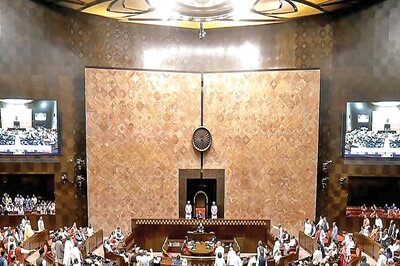
views
Thiruvananthapuram: G Madhavan Nair, former chief of the Indian Space Research Organisation, on Wednesday described the ‘Mission Shakti’ programme as “a major milestone” after India became the fourth nation to demonstrate its anti-satellite missile capability by shooting down a satellite.
“It is a major milestone as far as the defence of our space system is concerned,” Nair, who joined the BJP in October 2018, told News18. He also congratulated the government and Prime Minister Narendra Modi, who made the announcement in a live address a little after noon.
Nair said that India had the anti-satellite missile capability more than a decade ago but there was no political will at the time to demonstrate it. He said when China shot down an ageing weather satellite by launching a missile in 2007, India had the technology to undertake a similar mission.
The A-SAT missile shot down the Low Earth Orbit satellite within “three minutes of launch” and with remarkable precision and technical capability.
Nair said the space sector is very valuable for India since the country is “totally dependent” on satellites in everyday affairs with respect to broadcasting, communication and earth observation. Safeguarding space is of prime importance and India has successfully consolidated it technology in the area, he added.
“In case someone targets our satellites and destroys them, it will be a big catastrophe for us. We should be prepared to face such systems,” said Nair. “Once we have such an A-SAT system, people will hesitate before they target our space assets. It’s a message to the whole world that we are a space power and that they should keep away from disturbing our space assets.”
Former ISRO scientist and Padma Bhushan awardee Nambi Narayanan congratulated the defence sector and said it has achieved a major milestone. “Defence establishments generally do not announce their achievements. But here, since it is an outstanding activity, I think the prime minister chose to announce it to the country,” he said.
Narayanan said ‘Mission Shakti’ had given India the ability to act against a “misbehaving” or an “enemy” satellite. “That power is something big,” said the scientist, formerly the head of ISRO’s cryogenics division. In 1994, Narayanan was falsely charged with espionage and fought a long and protracted legal battle until the Supreme Court last year dropped the case against him.
‘Mission Shakti’, which was led by the Defence Research and Development Organisation, was aimed at strengthening India’s overall security, Modi said a fortnight before the start of the Lok Sabha elections on April 11. “The test has demonstrated the nation’s capability to defend its assets in outer space. It is a vindication of the strength and robust nature of the DRDO’s programmes,” the government said in a statement.
G Madhavan Nair reiterated the government’s stand that the strike was not aimed at any particular nation. “We have not touched any of the foreign satellites. It is a strong message for all countries, not just for China,” he said, referring to Beijing’s 2007 test when it destroyed an old weather satellite in a high polar orbit.
Nair maintained that no country should undertake weaponisation of space, which should be used for peaceful purposes. “We are bound by that and are not violating any international treaty,” he said.

















Comments
0 comment